This post will guide you on how to install RSAT on Windows 11. RSAT lets administrators manage core Windows Server roles such as Active Directory, DNS, DHCP, and Group Policy directly from a Windows 11 PC, so you don’t need to RDP into servers. This improves security by reducing interactive logons on domain controllers, speeds troubleshooting,
RSAT tools also include PowerShell modules for the installed components (for example, AD DS) that enable automation and consistent, repeatable changes at scale. If you encounter any issues during RSAT tool installation, open the Optional features history to find the exact error code. Refer to the guide Fix RSAT Installation Errors on Windows 11 to resolve the issue related to that specific error code.
Contents
Method 1: Using GUI method (Optional Features)
You will need administrator rights to install RSAT tools. Follow the steps below to install it on a Windows 11 device.
- Press Start and search for Optional features. Open Optional features.
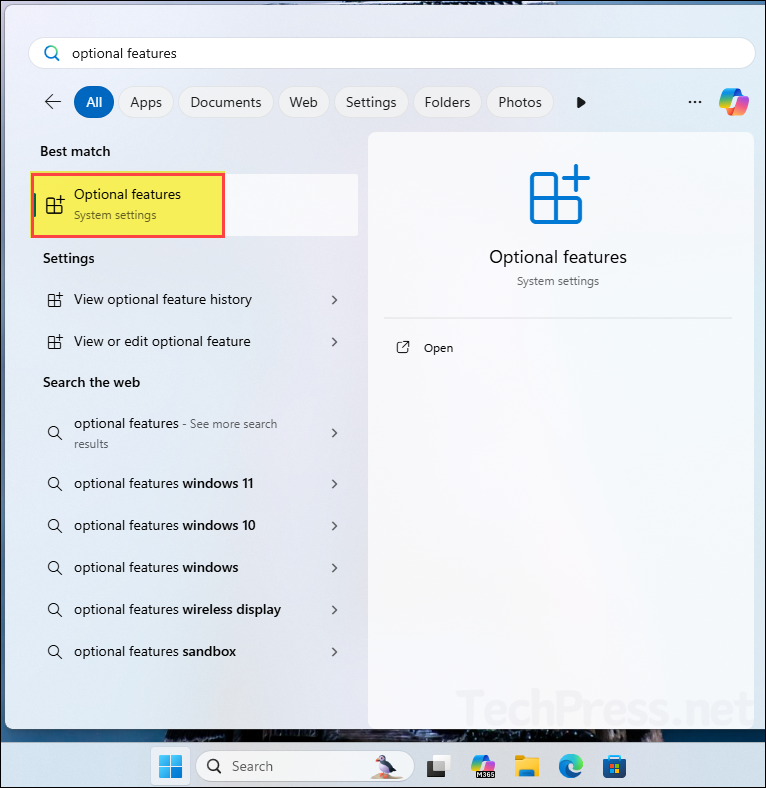
- Click on View features button > then click on see available features.
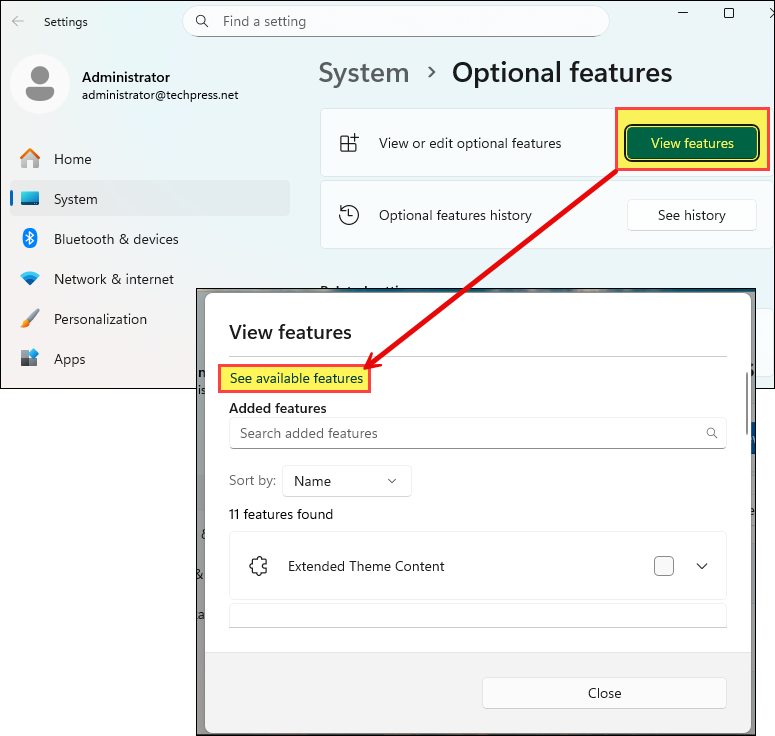
- Tick the tools you want (e.g., RSAT: Active Directory DS-LDS Tools, RSAT: DNS Server Tools, RSAT: DHCP Server Tools, RSAT: Group Policy Management Tools) and click on the Add button.
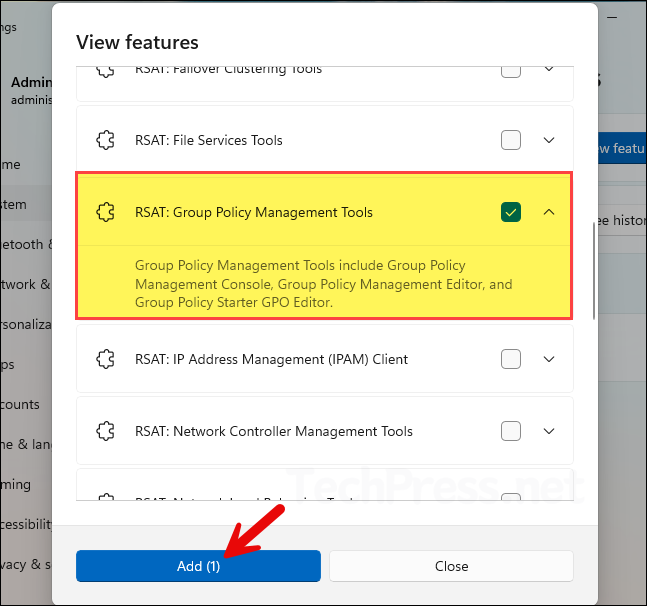
- RSAT: Group Policy Management Tools installing/adding progress status.
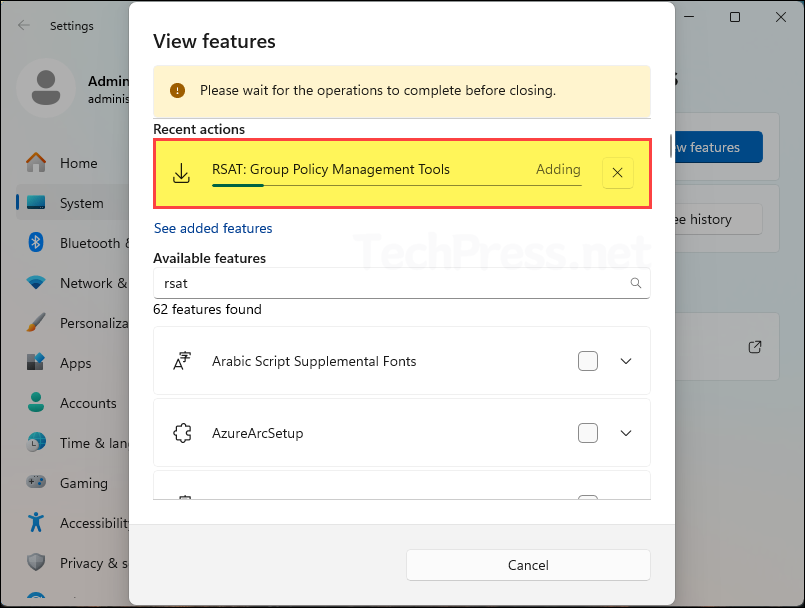
Method 2: Installing RSAT on Windows 11 using PowerShell
Another way to install RSAT tools on a Windows 11 PC is to use PowerShell command line one-liners. Run the commands below to install the tools you require.
List what’s available & installed
Get-WindowsCapability -Online -Name RSAT* | Select-Object Name, DisplayName, State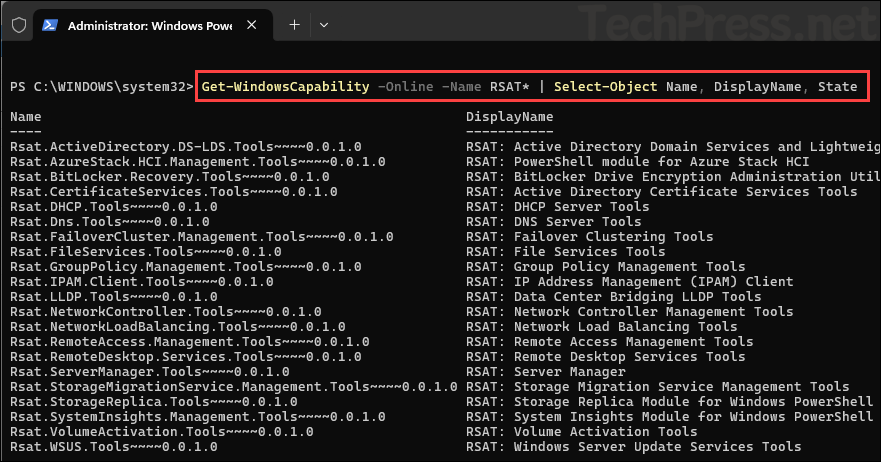
Install a specific RSAT tool (example: AD DS/AD LDS)
Add-WindowsCapability -Online -Name Rsat.ActiveDirectory.DS-LDS.Tools~~~~0.0.1.0
Install multiple RSAT tools at once
$tools = @(
'Rsat.ActiveDirectory.DS-LDS.Tools~~~~0.0.1.0',
'Rsat.Dns.Tools~~~~0.0.1.0',
'Rsat.DHCP.Tools~~~~0.0.1.0',
'Rsat.GroupPolicy.Management.Tools~~~~0.0.1.0'
)
$tools | ForEach-Object { Add-WindowsCapability -Online -Name $_ }Install all RSAT tools
Get-WindowsCapability -Online -Name RSAT* |
Where-Object State -eq 'NotPresent' |
Add-WindowsCapability -OnlineMethod 3: Use DISM to install RSAT tools
You can use the Deployment Image Servicing and Management (DISM) command-line tool to install RSAT tools on your computer. Let’s run a command to install one of the tools.
Install a specific tool (example: AD DS/AD LDS)
DISM /Online /Add-Capability /CapabilityName:Rsat.ActiveDirectory.DS-LDS.Tools~~~~0.0.1.0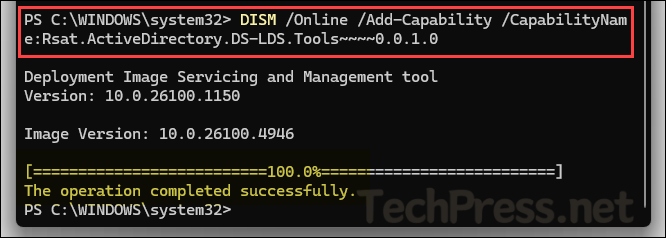
List RSAT capabilities
DISM /Online /Get-Capabilities | find "RSAT"Method 4: Install RSAT tools Offline
You might run into issues installing RSAT if your device is managed by WSUS or cannot reach the Windows Update service. If that happens, try one of the methods below (4.1 or 4.2).
4.1 Allow direct download for Features on Demand (recommended policy)
- Login to a domain controller with administrator rights.
- Go to Computer Configuration > Administrative Templates > System > “Specify settings for optional component installation and component repair”
- Check “Download repair content and optional features directly from Windows Update instead of WSUS.” Apply policy, then install via GUI/PowerShell as above.
4.2 Offline Installation using Language and Options Features ISO
- Get the Languages and Optional Features ISO for your exact Windows 11 build (e.g., 24H2).
- Mount/copy the LanguagesAndOptionalFeatures contents to a local path or share. (I have mounted the ISO to D:\LanguagesAndOptionalFeatures location).
- Install from that source (no Internet) and prevent contacting Windows Update:
$src = 'D:\LanguagesAndOptionalFeatures'
Add-WindowsCapability -Online `
-Name 'Rsat.ActiveDirectory.DS-LDS.Tools~~~~0.0.1.0' `
-Source $src `
-LimitAccessUninstall/Remove RSAT
If you no longer need RSAT tools on your device, you can remove them easily using either the GUI or PowerShell. Let’s go through both methods.
Remove RSAT using GUI method
- Click Start > search for Optional features > click view features button.
- Select the tool you want to remove and click on Remove button.
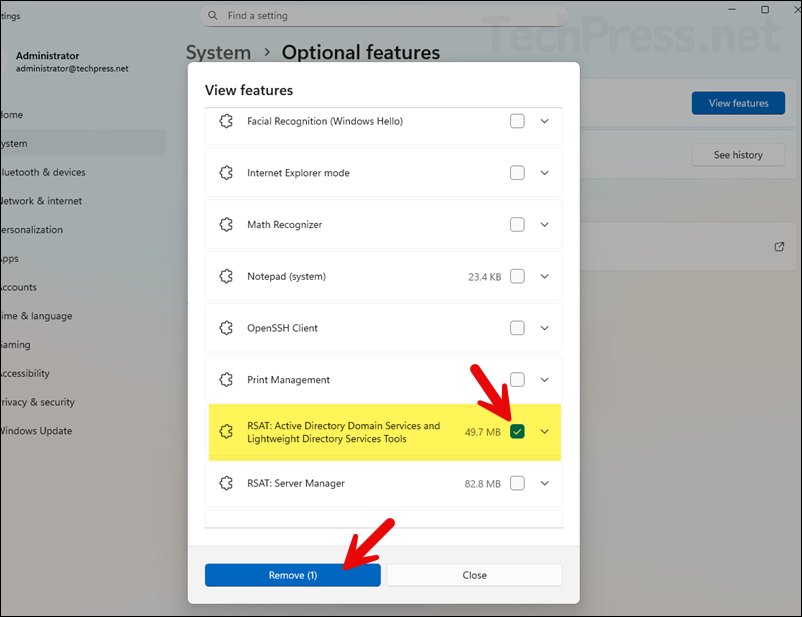
Remove RSAT using PowerShell method
Open PowerShell console as administrator and use below commands to remove RSAT tools.
Remove ADDS RSAT tools
Remove-WindowsCapability -Online -Name Rsat.ActiveDirectory.DS-LDS.Tools~~~~0.0.1.0Remove All RSAT tools
Get-WindowsCapability -Online -Name RSAT* | Where-Object State -eq 'Installed' | ForEach-Object { Remove-WindowsCapability -Online -Name $_.Name }Verify RSAT Tools Installation
You can check which RSAT tools are installed on your device by using Optional features GUI or by using below PowerShell command.
Check which RSAT tools are Installed
Get-WindowsCapability -Online -Name RSAT* | Select Name, State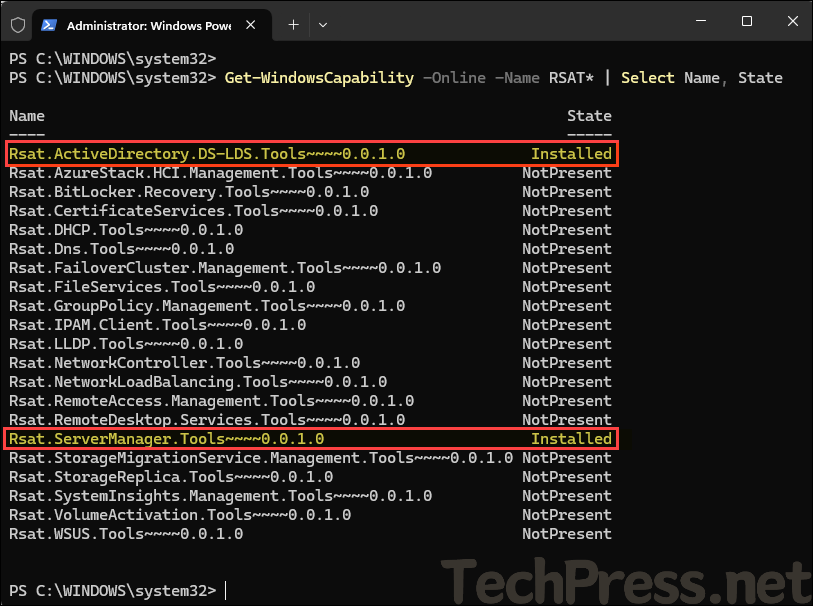
Troubleshooting
If you experience any issues with RSAT installation, use below guidance to resolve the specific error.
- Nothing shows under “RSAT” in Optional features: You’re likely on Windows 11 Home (unsupported) or your device can’t reach Windows Update/feature source. Install RSAT tools offline (method 4.2) given in this post.
- 0x800f0950 / 0x800f0954 errors during Add-WindowsCapability: Often WSUS/feature-source issues. Enable the policy in 4.1 section or install RSAT tools offline (method 4.2) given in this post.
- Slow Installation of RSAT tools: RSAT installs each capability separately; installing “all” can take a while. Consider installing only what you need, or use policy as given in 4.1 section of this post.
Conclusion
In this post, we explored different ways to install RSAT tools on a Windows 11 system. RSAT is useful when you need to manage Windows services remotely from your PC. We also looked at the options to uninstall or remove RSAT tools if you no longer need them.
I am adding below handy one-liners which you can copy and paste in to the PowerShell console to install the required tools on a Windows 11 PC.
Installing AD, DNS, DHCP and GPMC
'Rsat.ActiveDirectory.DS-LDS.Tools~~~~0.0.1.0',
'Rsat.Dns.Tools~~~~0.0.1.0',
'Rsat.DHCP.Tools~~~~0.0.1.0',
'Rsat.GroupPolicy.Management.Tools~~~~0.0.1.0' |
ForEach-Object { Add-WindowsCapability -Online -Name $_ }List only the installed RSAT tools
Get-WindowsCapability -Online -Name RSAT* |
Where-Object State -eq 'Installed' |
Select Name, DisplayNameInstall everything RSAT offers
Get-WindowsCapability -Online -Name RSAT* |
Where-Object State -eq 'NotPresent' |
Add-WindowsCapability -Online